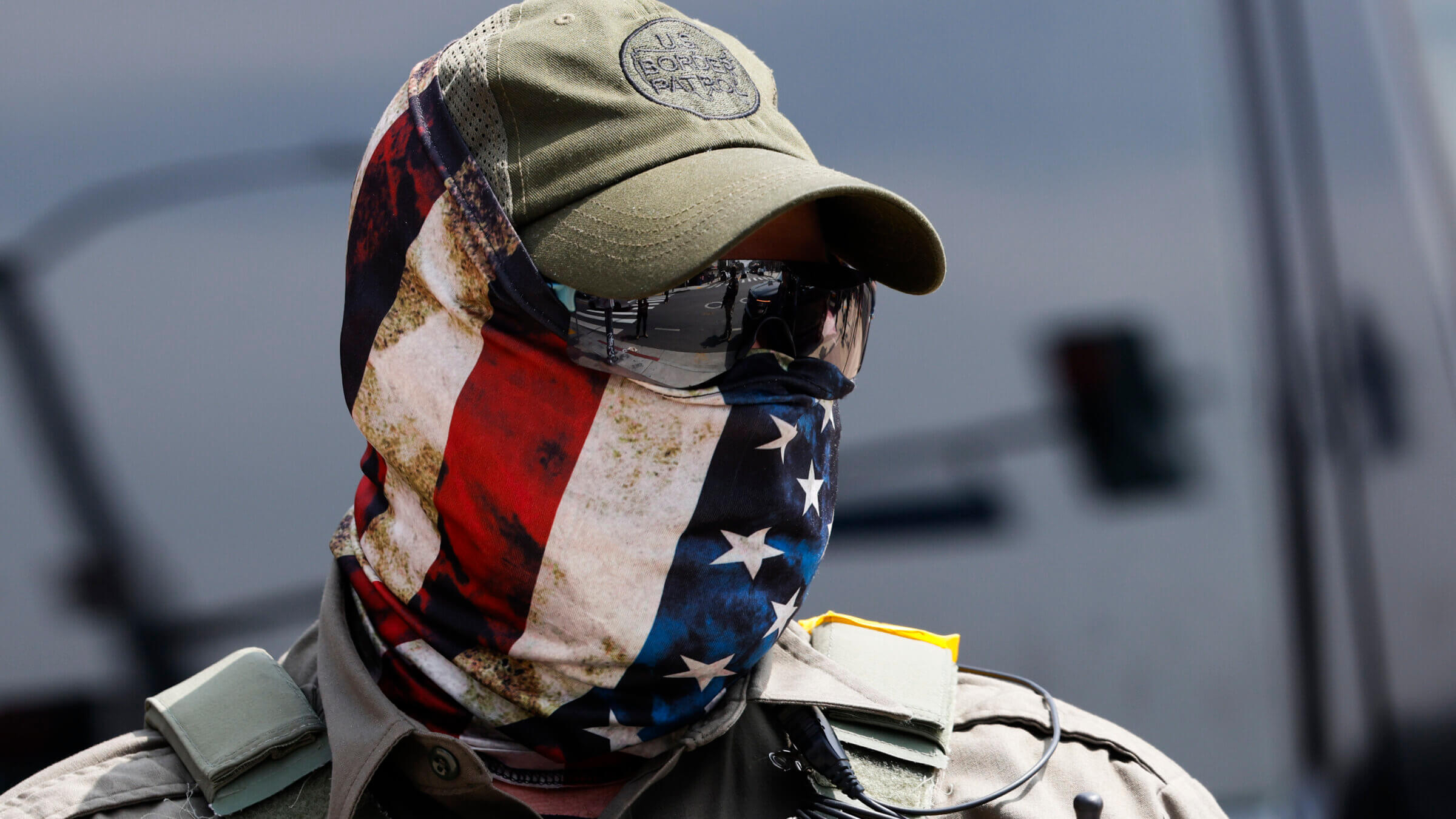A Reichstag fire is blazing in Trump’s America and we know exactly who is fanning the flames
The question isn’t whether authoritarianism has arrived in our country; the question is what we’re going to do about it

US Border Patrol outside the Japanese American National Museum where Gov. Gavin Newsom was holding a redistricting press conference Aug. 14 in Los Angeles. Photo by Getty Images
As Gavin Newsom stood inside the Japanese American National Museum in Los Angeles to announce a California redistricting initiative aimed at countering gerrymandering in Texas ordered up by Donald Trump, federal agents in tactical gear massed outside. Helmets. Guns. Concealed identities. No clear explanation. Just presence.
It wasn’t a raid. But it was a message.
Nine decades ago, Adolf Hitler used the torching of the Reichstag as a pretext for smashing democracy and creating a police state.
Now it’s Trump who is actively constructing the architecture of a police state. The evidence is visible daily — on social media, cable news, digital news platforms, and in broad daylight on American streets. It’s not just the rounding-up of undocumented immigrants; it’s the overt deployment of federal agents, police and military forces to intimidate, suppress dissent, and enforce obedience to an authoritarian agenda.
America doesn’t have a Gestapo. But tactics used by multiple agencies evoke those employed by secret police forces in authoritarian regimes: the USSR under Stalin, Chile under Augusto Pinochet, Cuba under Fidel Castro, and El Salvador under Trump’s avowed friend and partner in autocracy, Nayib Bukele.
With the mobilization of 1,700 National Guard troops in 19 states as part of Trump’s immigration crackdown, and with masked federal agents conducting traffic stops, detaining immigrants in unmarked vehicles, and prowling residential neighborhoods, along with a growing catalog of abuses of federal power for political ends, America increasingly resembles a banana republic more than a functioning democracy.
Trump, on multiple occasions, has expressed admiration for steps taken by despots to stifle dissent. Most recently, he insisted he is not acting like a “dictator” by deploying federal law enforcement to U.S. cities under the banner of crime control — but in the same breath, he claimed that some Americans might welcome one.
“A lot of people are saying, ‘Maybe we would like a dictator.’ I don’t like a dictator; I’m not a dictator. I’m a man with great common sense, and I’m a smart person,” Trump told reporters on Monday. Moments later he signed an executive order creating specially trained National Guard units for “quelling civil disturbances” anywhere in the U.S., a significant escalation in Trump’s militarization of law enforcement.
Hitler began laying the foundations for a police state even before he became chancellor through a backroom political deal in January 1933. During the ill-fated Weimar Republic, the Nazi leader had his Sturmabteilung, or SA, paramilitary shock troops terrorize the public and use violence against his political opponents, trade unionists and Jews.
After Hitler’s appointment as chancellor, the Reichstag fire of February 1933 became the accelerant for authoritarian consolidation. Warning of a Communist plot, Hitler pushed through the Reichstag Fire Decree, suspending civil liberties and enabling mass arrests. Political opponents were silenced, newspapers shuttered, and the groundwork laid for the Enabling Act — legislation that gave Hitler absolute power.
The Nazi police state was assembled piece by piece — through the centralization of police forces under Heinrich Himmler, the merging of the Gestapo with the SS, and the transformation of law enforcement into a tool of ideological enforcement. Surveillance, intimidation and arbitrary detention became normalized. The line between policing and political persecution disappeared.
In Nazi Germany, it was the Reichstag fire that gave Hitler the pretext to create a police state. In America, it is Trump himself who plays the arsonist — igniting not one blaze but many, each fueled by crises of his own making.
Since the start of his second term, Trump has declared a national emergency over immigration, escalated federal interventions in cities under the guise of combating crime, and launched sweeping efforts to delegitimize elections through claims of fraud. These manufactured emergencies have served not as responses to chaos, but as pretexts: for deploying federal agents, bypassing congressional oversight, and consolidating executive power. An executive order issued on April 28, 2025, did more than authorize military-grade equipment for local police; it expanded federal jurisdiction over city law enforcement and laid the groundwork for a nationalized security apparatus.
Now, with a $30 billion infusion from Congress, Trump’s administration is rushing to hire 10,000 new ICE agents. The recruitment campaign is not subtle, and feels more like mobilization than law enforcement. Wartime-style posters — featuring a finger-pointing Uncle Sam — declare: “America has been invaded by criminals and predators. We need YOU to get them out.” In promotional videos, armored vehicles roll through neighborhoods. Applicants are promised up to $50,000 in signing bonuses, student loan forgiveness, and the chance to “defend the homeland.” Age limits have been waived. Retired federal officers are being lured back with dual paychecks and appeals to patriotic duty.
Since May, applicants for civil service jobs must answer questions about how they would help implement the president’s executive orders and policy priorities. Critics have called it a blatant loyalty test. New recruits at ICE and other federal agencies will be expected to carry out directives that may test the boundaries of legality.
More and more, Americans are using the word “authoritarianism” to describe what they believe is happening — or has already happened — as Trump intensifies his dismantling of democracy with mobster-style extortions of universities and law firms, ongoing efforts to recast American history as a white supremacist fairy tale, and the creation of a Department of Justice initiative that scrutinizes institutions whose work fails to align with the administration’s vision of patriotic orthodoxy.
What will Americans do with this expanding realization that democracy is teetering on a precipice?
The question is no longer whether Trump is building a police state. The question is whether Americans will let him finish it — and, like those who watched the Reichstag burn, remain silent as democracy is consumed.

















